八年级下册Unit 1 What's the matter?Section A 1a-1c 课件(共有PPT18张)
文档属性
| 名称 | 八年级下册Unit 1 What's the matter?Section A 1a-1c 课件(共有PPT18张) | 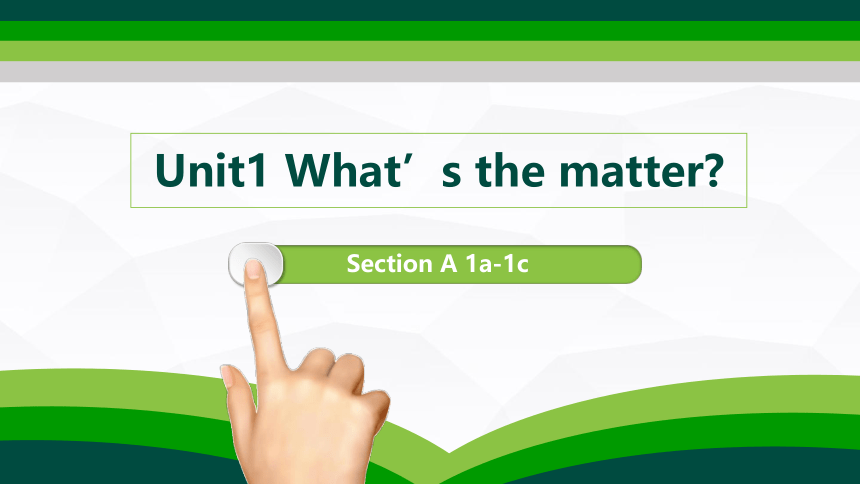 | |
| 格式 | zip | ||
| 文件大小 | 2.1MB | ||
| 资源类型 | 教案 | ||
| 版本资源 | 人教新目标(Go for it)版 | ||
| 科目 | 英语 | ||
| 更新时间 | 2022-02-03 09:11:24 | ||
图片预览

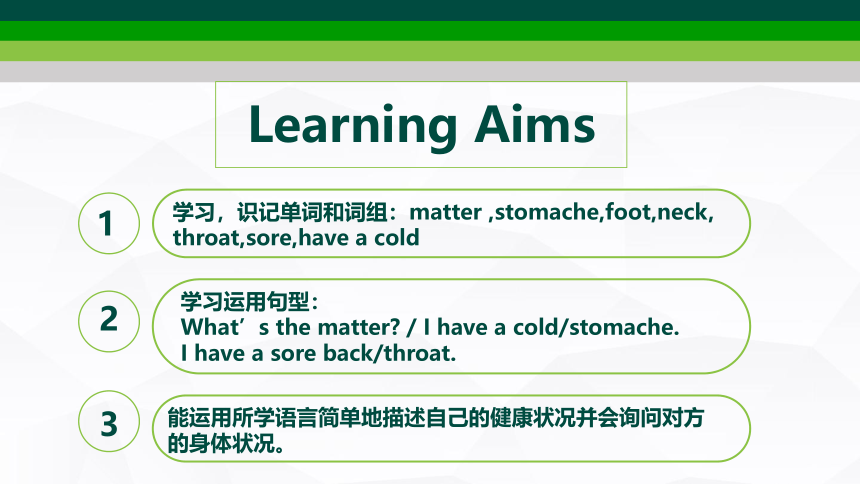
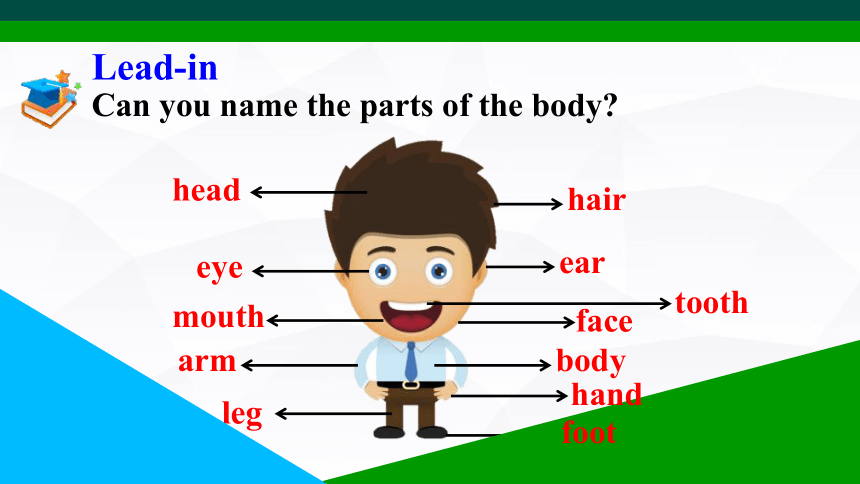
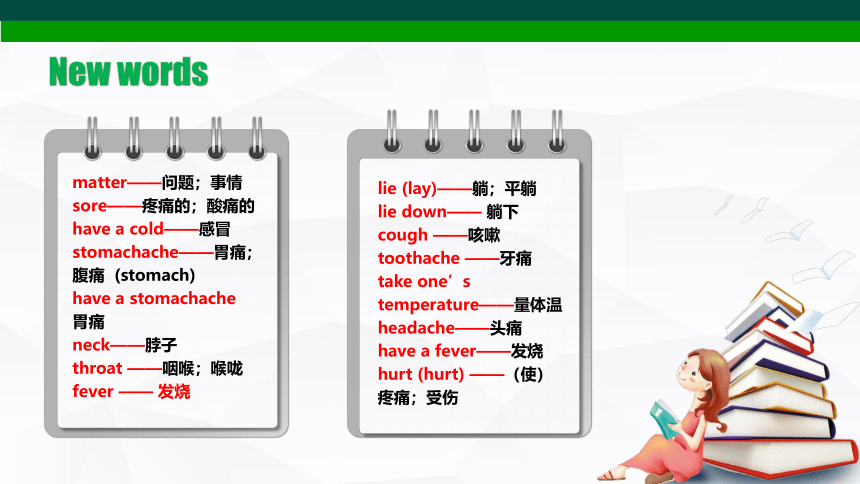
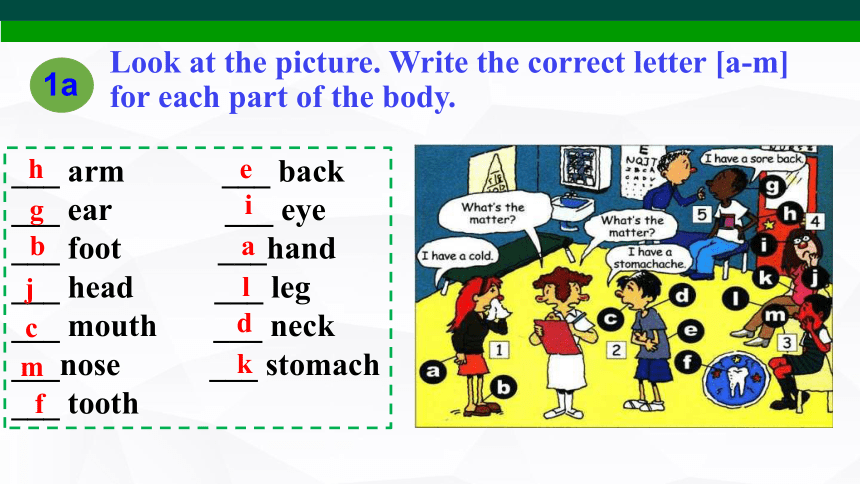
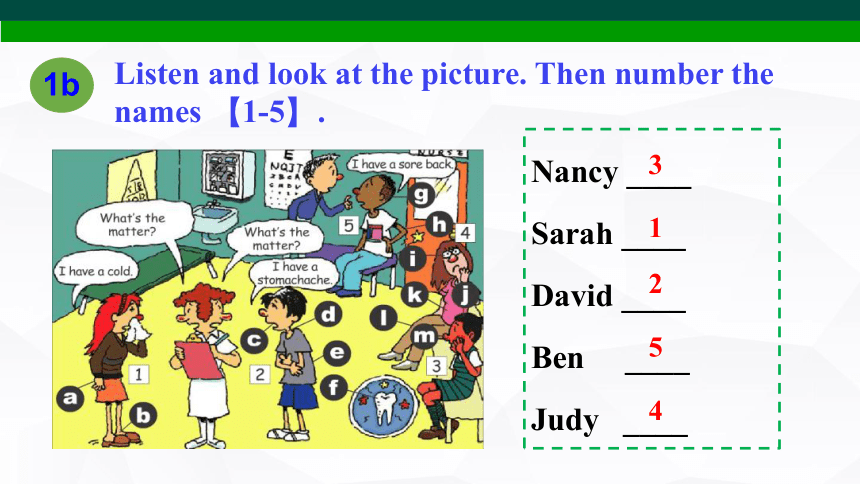
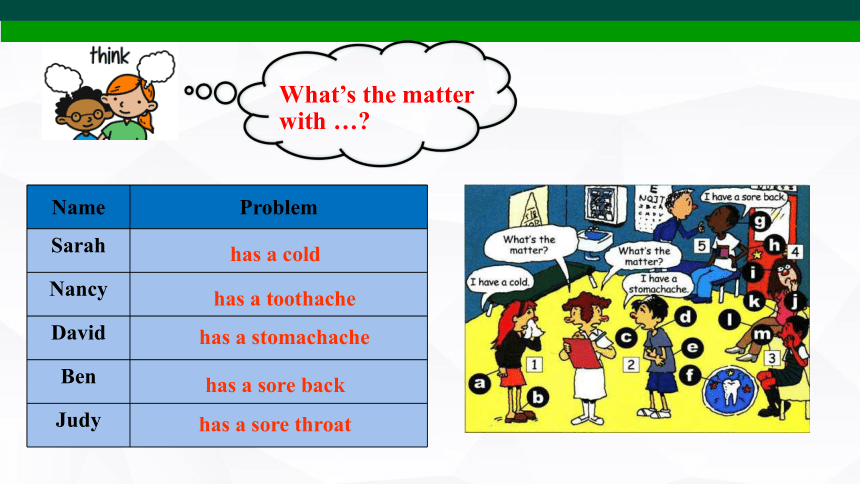
文档简介
(共18张PPT)
Section A 1a-1c
Unit1 What’s the matter
学习,识记单词和词组:matter ,stomache,foot,neck,
throat,sore,have a cold
学习运用句型:
What’s the matter / I have a cold/stomache.
I have a sore back/throat.
能运用所学语言简单地描述自己的健康状况并会询问对方
的身体状况。
1
2
3
Learning Aims
Lead-in
Can you name the parts of the body
head
eye
mouth
arm
leg
ear
tooth
face
body
hand
foot
hair
New words
matter——问题;事情
sore——疼痛的;酸痛的
have a cold——感冒
stomachache——胃痛;腹痛 (stomach)
have a stomachache 胃痛
neck——脖子
throat ——咽喉;喉咙
fever —— 发烧
lie (lay)——躺;平躺
lie down—— 躺下
cough ——咳嗽
toothache ——牙痛
take one’s temperature——量体温
headache——头痛
have a fever——发烧
hurt (hurt) ——(使)疼痛;受伤
1a
Look at the picture. Write the correct letter [a-m] for each part of the body.
___ arm ___ back
___ ear ___ eye
___ foot ___hand
___ head ___ leg
___ mouth ___ neck
___nose ___ stomach
___ tooth
h
e
g
i
b
a
j
l
c
d
m
k
f
1b
Listen and look at the picture. Then number the names 【1-5】.
Nancy ____
Sarah ____
David ____
Ben ____
Judy ____
3
1
2
5
4
What’s the matter
with …
Name Problem
Sarah
Nancy
David
Ben
Judy
has a cold
has a toothache
has a stomachache
has a sore back
has a sore throat
Retell
Nurse: You don't look well. What's the matter, Sarah
Sarah: I was playing with my friends at the park yesterday.
Then it got windy,but I didn’t ________ (穿上) on my
jacket. Now _____________ (感冒了).
Nurse: What's the matter, David Are you OK
David: I ate __________ (太多) junk food at my friend’s birthday
party. So last night, ____________________. (肚子痛) I almost
couldn’t get myself out of bed this morning.
put on
I have a cold
too much
I got a stomachache
Retell
Nurse: What’s the matter, Ben Can you move
Ben: Not really. I was playing soccer the other day and I ___________ (伤到自己).It seemed OK at first, but now _____________________ (我现在背真的很酸痛).
Nurse: You look really tired. What's the matter, Nancy
Nancy: I didn’t ____________ (睡得好) Last night. ___________ (我牙疼). It’s terrible! I can’t really eat anything either. It hurts a lot.
Nurse: What's the matter, Judy
Judy: I'm sorry, but it's very difficult for me to talk.
Nurse: Oh, dear. What's the matter
Judy: I ________________ (讲了太多话) yesterday and didn’t ________________(喝足够的水) I have a very sore throat now.
hurt myself
I have a really sore back
sleep very well
I have a toothache
talked too much
drink enough water
1c
Look at the picture. What are the students’ problems Make conversations.
What’s the matter
with Judy
She talked too much
yesterday and didn’t
drink enough water. She has a very sore throat now.
What’s the matter
with Sarah
She didn’t take care of herself on the weekend. She was playing with her friends at the park yesterday. Then it got windy, but she didn’t put on her jacket. Now she has a cold.
Pair work
What is happening in each picture
Discuss with your group members.
What’s the matter with him
He…
What’s the matter with her
She…
What’s the matter with her
She…
What’s the matter with her
She…
Language points
1. What’s the matter
这是人们特别是医生和护士询问病人病情时的常用问句, 意思是“怎么了 ”,其后常与with连用。
【类似的有:】
What’s wrong 怎么啦
What’s wrong with you 你怎么了
What’s your trouble 你怎么了
What’s the trouble with you 你怎么了
What’s up 你怎么了
2. have a sore back 腰痛
(1)have vt. 患(得)病(不用于进行时态)
He had a bad cold last week.
他上周患了重感冒。
一般情况下用“have+a+n.” 表示患了某种疾病。
在英语中,表达“疼痛或不舒服”时的常用结构:
(1)主语+have/has +a 病症
eg: have a cold/fever
Language points
(2)主语+have/ has+ a+ sore+发病部位
sore 是一个独立的形容词,指的是身体某一部位的酸痛。如:sore back, sore throat, sore neck.
(3)主语+have/ has + a+部位-ache
-ache作后缀,常与表示身体部位的名词合成一个新词,表身体某部位疼痛,如:toothache, headache, stomachache.
Language points
Thanks for your watching!
Thank you
Section A 1a-1c
Unit1 What’s the matter
学习,识记单词和词组:matter ,stomache,foot,neck,
throat,sore,have a cold
学习运用句型:
What’s the matter / I have a cold/stomache.
I have a sore back/throat.
能运用所学语言简单地描述自己的健康状况并会询问对方
的身体状况。
1
2
3
Learning Aims
Lead-in
Can you name the parts of the body
head
eye
mouth
arm
leg
ear
tooth
face
body
hand
foot
hair
New words
matter——问题;事情
sore——疼痛的;酸痛的
have a cold——感冒
stomachache——胃痛;腹痛 (stomach)
have a stomachache 胃痛
neck——脖子
throat ——咽喉;喉咙
fever —— 发烧
lie (lay)——躺;平躺
lie down—— 躺下
cough ——咳嗽
toothache ——牙痛
take one’s temperature——量体温
headache——头痛
have a fever——发烧
hurt (hurt) ——(使)疼痛;受伤
1a
Look at the picture. Write the correct letter [a-m] for each part of the body.
___ arm ___ back
___ ear ___ eye
___ foot ___hand
___ head ___ leg
___ mouth ___ neck
___nose ___ stomach
___ tooth
h
e
g
i
b
a
j
l
c
d
m
k
f
1b
Listen and look at the picture. Then number the names 【1-5】.
Nancy ____
Sarah ____
David ____
Ben ____
Judy ____
3
1
2
5
4
What’s the matter
with …
Name Problem
Sarah
Nancy
David
Ben
Judy
has a cold
has a toothache
has a stomachache
has a sore back
has a sore throat
Retell
Nurse: You don't look well. What's the matter, Sarah
Sarah: I was playing with my friends at the park yesterday.
Then it got windy,but I didn’t ________ (穿上) on my
jacket. Now _____________ (感冒了).
Nurse: What's the matter, David Are you OK
David: I ate __________ (太多) junk food at my friend’s birthday
party. So last night, ____________________. (肚子痛) I almost
couldn’t get myself out of bed this morning.
put on
I have a cold
too much
I got a stomachache
Retell
Nurse: What’s the matter, Ben Can you move
Ben: Not really. I was playing soccer the other day and I ___________ (伤到自己).It seemed OK at first, but now _____________________ (我现在背真的很酸痛).
Nurse: You look really tired. What's the matter, Nancy
Nancy: I didn’t ____________ (睡得好) Last night. ___________ (我牙疼). It’s terrible! I can’t really eat anything either. It hurts a lot.
Nurse: What's the matter, Judy
Judy: I'm sorry, but it's very difficult for me to talk.
Nurse: Oh, dear. What's the matter
Judy: I ________________ (讲了太多话) yesterday and didn’t ________________(喝足够的水) I have a very sore throat now.
hurt myself
I have a really sore back
sleep very well
I have a toothache
talked too much
drink enough water
1c
Look at the picture. What are the students’ problems Make conversations.
What’s the matter
with Judy
She talked too much
yesterday and didn’t
drink enough water. She has a very sore throat now.
What’s the matter
with Sarah
She didn’t take care of herself on the weekend. She was playing with her friends at the park yesterday. Then it got windy, but she didn’t put on her jacket. Now she has a cold.
Pair work
What is happening in each picture
Discuss with your group members.
What’s the matter with him
He…
What’s the matter with her
She…
What’s the matter with her
She…
What’s the matter with her
She…
Language points
1. What’s the matter
这是人们特别是医生和护士询问病人病情时的常用问句, 意思是“怎么了 ”,其后常与with连用。
【类似的有:】
What’s wrong 怎么啦
What’s wrong with you 你怎么了
What’s your trouble 你怎么了
What’s the trouble with you 你怎么了
What’s up 你怎么了
2. have a sore back 腰痛
(1)have vt. 患(得)病(不用于进行时态)
He had a bad cold last week.
他上周患了重感冒。
一般情况下用“have+a+n.” 表示患了某种疾病。
在英语中,表达“疼痛或不舒服”时的常用结构:
(1)主语+have/has +a 病症
eg: have a cold/fever
Language points
(2)主语+have/ has+ a+ sore+发病部位
sore 是一个独立的形容词,指的是身体某一部位的酸痛。如:sore back, sore throat, sore neck.
(3)主语+have/ has + a+部位-ache
-ache作后缀,常与表示身体部位的名词合成一个新词,表身体某部位疼痛,如:toothache, headache, stomachache.
Language points
Thanks for your watching!
Thank you
同课章节目录
- Unit 1 What's the matter?
- Section A
- Section B
- Unit 2 I'll help to clean up the city parks.
- Section A
- Section B
- Unit 3 Could you please clean your room?
- Section A
- Section B
- Unit 4 Why don't you talk to your parents?
- Section A
- Section B
- Unit 5 What were you doing when the rainstorm came
- Section A
- Section B
- Review of Units 1-5
- Unit 6 An old man tried to move the mountains.
- Section A
- Section B
- Unit 7 What's the highest mountain in the world?
- Section A
- Section B
- Unit 8 Have you read Treasure Island yet?
- Section A
- Section B
- Unit 9 Have you ever been to a museum?
- Section A
- Section B
- Unit 10 I've had this bike for three years.
- Section A
- Section B
